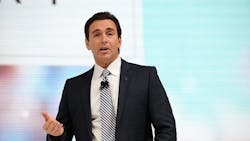Ford CEO Calls Trump Accusations About Jobs ‘Disappointing’
Ford Motor Co.’s (IW 500/4) top executive said he’s disappointed by Republican presidential candidate Donald Trump’s accusations that the automaker is moving jobs to Mexico and reiterated that the transfer of small-car production will result in “zero” job loss in the U.S.
“Our commitment to American jobs is stronger than it ever has been,” CEO Mark Fields said in an interview at the Bloomberg Markets Most Influential Summit. “The facts are, zero jobs are going to be impacted here in the U.S.”
Ford is moving production of its slow selling Focus compact car and C-Max hybrid to Mexico, where labor costs are lower, to generate a better return for shareholders, Fields said in a follow-up interview with Bloomberg Television.
It is replacing those models in the factory in Michigan with two new products, Fields said. People familiar with Ford’s plans have said the new models will be the Ranger compact pickup and a revived Bronco sport utility vehicle.
“We’re in the presidential election season and there’s lots of things said on the campaign trail,” Fields said. “It’s really disappointing when politics gets in the way of facts.”
On Defense
Fields has spent some of the past two weeks battling Trump’s accusations, repeated during Monday’s presidential debate, that the automaker is firing U.S. employees to move work to Mexico. The company took to Twitter and other social media during the debate to counter the claims. Trump has threatened to levy a 35% tariff on Ford’s Mexican-built cars if he’s elected in November.
“We want to make sure we run a responsible business, drive returns for our shareholders,” Fields said. “As a multinational business, we really have to look where we can make good returns and satisfy customers.”
Fields declined to say whether Ford would employ more U.S. workers if there was no North American Free Trade Agreement, which Trump has criticized as the worst trade deal ever.
“That’s a hypothetical question,” Fields said. “What’s said on the campaign trail and governing sometimes can be very different things.”
In addition to seeking a better return for shareholders, Fields said Ford puts a priority on “driving economic development in the countries that we do business in and, of course, that’s very important here in our home market.” The company has hired 28,000 workers in the U.S. since 2011 and invested more than $12 billion at home, he said.
Reworking Ford
Fields is attempting to overhaul the 113-year-old automaker as the industry confronts changes from the sharing economy and the advent of the autonomous car. Fields aims to transform Ford into a mobility company that captures a piece of the $5.4 trillion transportation services business.
By 2021, Ford has promised to start selling more than 100,000 self-driving robot taxis -- with no steering wheel, brake or gas pedals -- to ride-hailing and ride-sharing fleets. The company also is introducing a commuter-van service and bike sharing in San Francisco, with plans to go nationwide.
Investors haven’t reacted favorably the cost of converting Ford, driving down shares 30% since Fields became CEO July 1, 2014. Over the past month, Ford has warned financial results will decline this year and next as it invests in driverless cars and mobility services. The payoff is the promise of 20% profit margins in these as-yet untapped mobility markets -- more than double the returns of the traditional car business.
By Keith Naughton
About the Author
Bloomberg
Licensed content from Bloomberg, copyright 2016.
